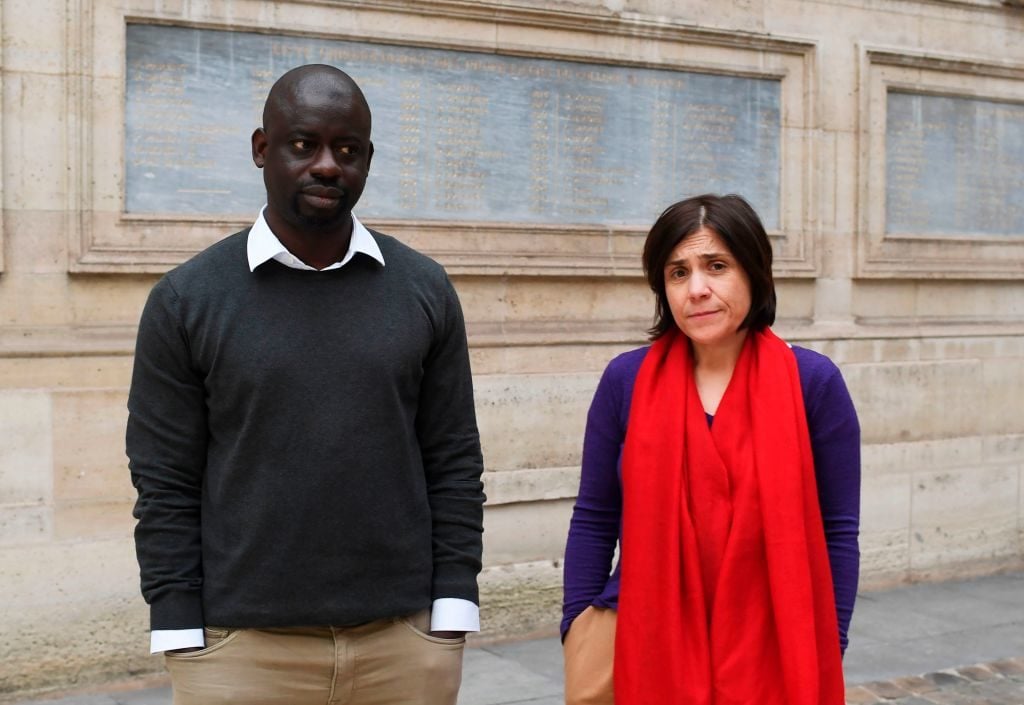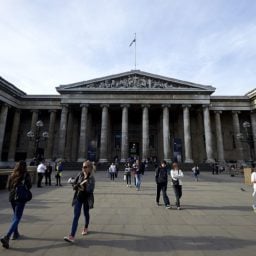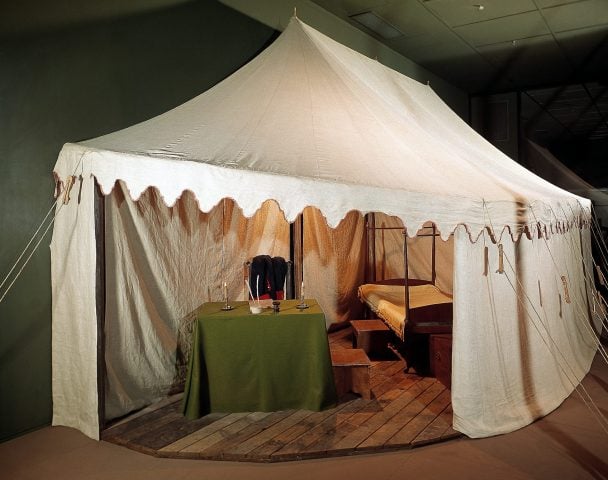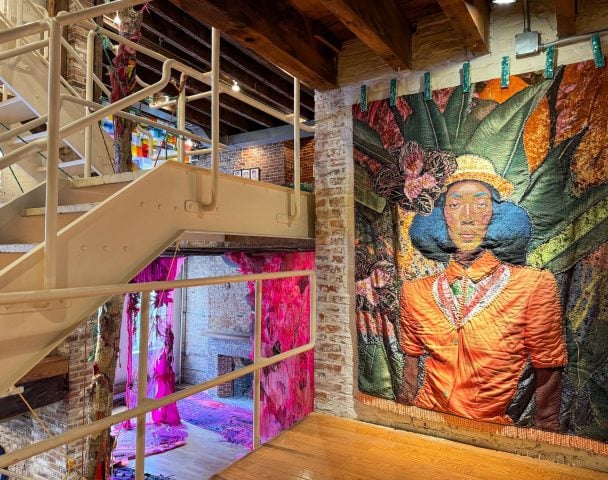A highly anticipated report, commissioned by the French President Emmanuel Macron, recommends the permanent repatriation of African heritage looted during the colonial era. The contents of the 108-page study could have far-reaching implications for not only French institutions but also international museums that are facing increasing calls to return works of art and artifacts that come from countries in Africa and beyond, which were arguably stolen.
According to the French weekly magazine Le Point, which has previewed the report, its authors—French art historian Bénédicte Savoy and Senegalese academic writer Felwine Sarr—support the permanent restitution of African heritage, taking a groundbreaking position on the hotly contested issue. They refer to artifacts acquired through “theft, looting, despoilment, trickery, and forced consent,” in support of their use of the word “restitution.” The full document is set to be released on Friday (November 23) at the presidential Elysée Palace in Paris.
Macron commissioned the report last year following a historic speech in which he declared that, within the next five years, conditions for the temporary or permanent restitution of African heritage held in French museums should be set. He tasked Savoy and Sarr with offering their recommendations. Over the past year, the two have consulted around 150 specialists in France and on the continent.
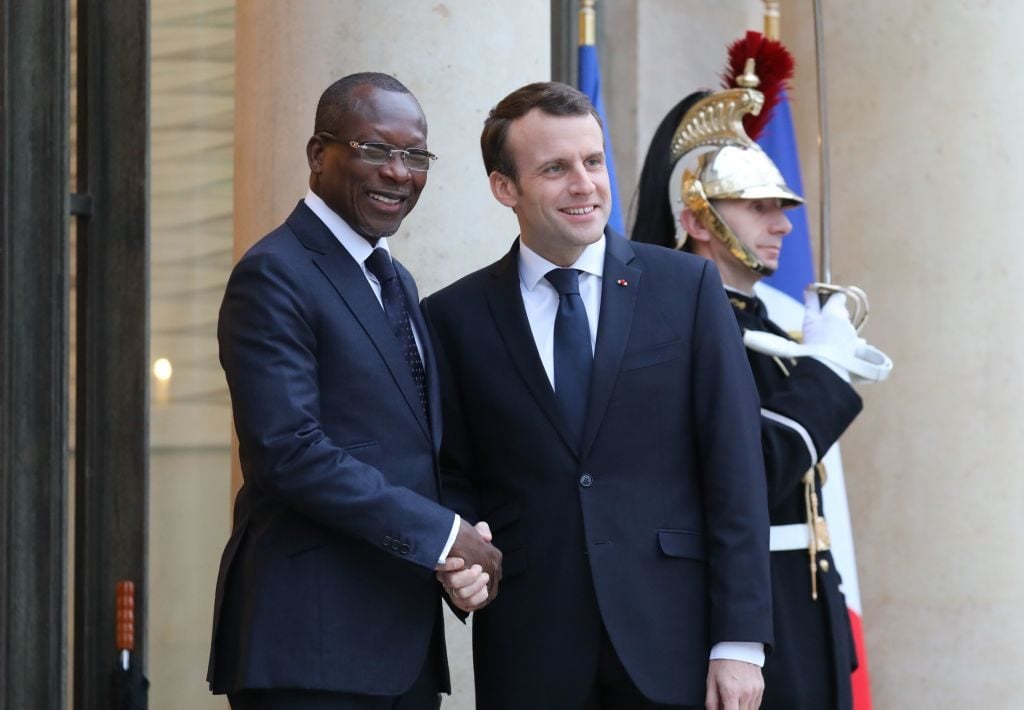
France’s president Emmanuel Macron shakes hands with Benin’s president Patrice Talon during his arrival to the Elysee Palace on March 5, 2018 in Paris. Photo by Ludovic Marin/AFP/Getty Images.
Permanent Restitution
The report has been anxiously awaited by the directors of French museums and galleries, many of whom hope the document will temper some of the more radical proposals that have been suggested.
It seems that the opposite is the case. “Behind the mask of beauty, the question of restitution invites us to go right to the heart of a system of appropriation and alienation, the colonial system, of which some European museums are today, in their own right, public archives,” begins the eloquently written report.
The appropriateness of the term “restitution” has been disputed within the French museum community, but Savoy and Sarr take a strong position in their continued use of the word. “This term reminds us that the appropriation and enjoyment of the property being returned is based on a morally reprehensible act (theft, looting, despoilment, trickery, forced consent, etc.),” they write.
The report comes at a time when the subject of colonial restitution has been catapulted from an insider topic within museum communities to a worldwide public issue. The opening of the Humboldt Forum in Berlin, which will house a major collection of objects from Africa and Asia in 2019, has further sparked deep division on the issue of how Europe should handle its colonial legacy. Savoy resigned from her position on Humboldt Forum’s Advisory Board in a surprise move last year, and was later invited by Macron to contribute to the report.
Savoy and Sarr write that “transitional solutions,” like temporary returns or loans, should be in place only “until legal mechanisms are found to allow the final and unconditional return of heritage objects to the African continent.” This statement comes on the heels of the announcement late last month that museums would loan objects back to Nigeria for their planned national museum, which was met with outrage by certain parties within the African nation.
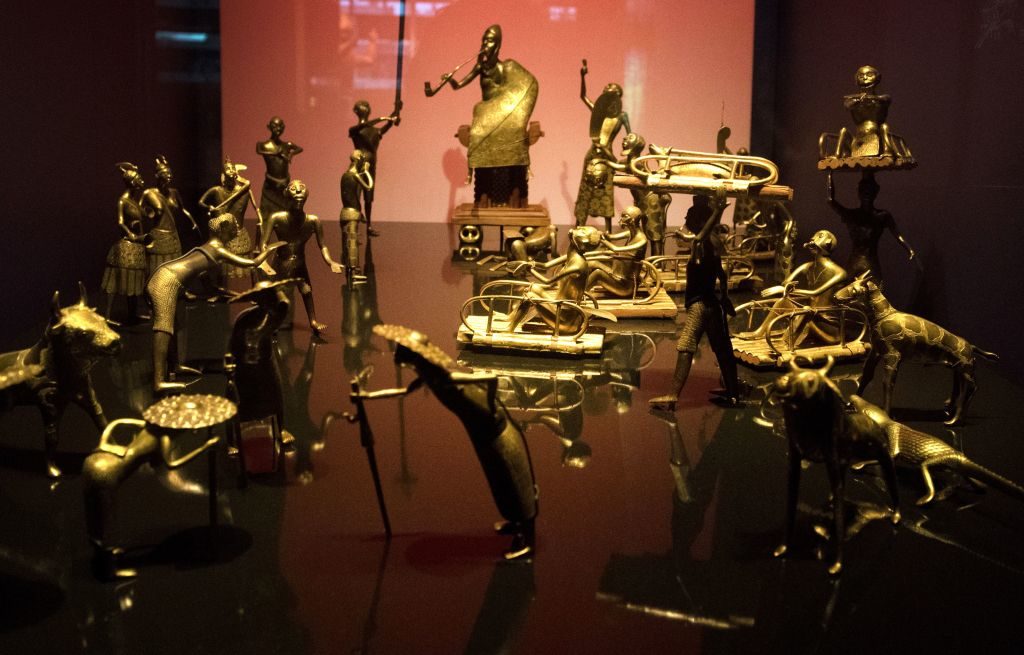
The Ato ceremony of the Kingdom of Dahomey, circa 1934 is pictured at the Quai Branly Museum-Jacques Chirac in Paris. Benin is demanding restitution of its national treasures that had been taken from the former French colony Dahomey (current Benin). Photo: GERARD JULIEN/AFP/Getty Images.
Beyond Sub-Saharan Africa
According to Le Point, the introduction states that the report “concerns only the sub-Saharan part of Africa.” That means that all of French North Africa—modern day Morocco, Algeria, and Tunisia—are excluded. In total, France occupied or colonized, at various times, at least 20 current or former countries in Africa. The nation was a foremost player in the continent’s European colonization and several African nations are still dependent protectorate territories.
The report also recommends rigorous examination of various criteria in determining which objects should be restituted. Works that can be proven to have been acquired with “free, fair, and documented consent” may be retained by French museums.
Objects seized during 18th- and 19th-century military campaigns and scientific missions, or objects that were gifted to museums by any agents of colonial administration or their descendants without consent of their original owners, will have a different fate. Addressing the major concerns that French museums could be “emptied,” the two recommend the creation of duplicates or facsimiles of objects, where appropriate.
France’s holdings of cultural objects from its colonial empire are vast, so there will likely be a strong reaction from the museums when the full report is released at the end of the week. One of the most prominent collections is that of the Musée du quai Branly – Jacques Chirac, which holds 450,000 objects from Africa, Asia, Oceania, and the Americas. artnet News reached out to Stéphane Martin, the president of the museum, to comment on the preview of the report, but the institution said he will wait to respond until the full document can be read on Friday.
Exactly how the report is received by Macron and put into action remains, for now, an open question. Regardless, Savoy and Sarr offer a radical shift on how respective parties must view the issue of colonial era artifacts. They write that the problem arises when a museum is not affirming a national identity but is instead conceived as a museum of “the other,” keeping objects taken from elsewhere and assuming the right to speak about these others, or on their behalf. “Through the objects and stories held in so-called ethnographic collections, controlled representations of societies, which are often essentialized, have been put in place,” they write.
“To speak openly about restitution is to speak of justice, rebalancing, recognition, restoration and reparation,” continue Savoy and Sarr. “But above all, it is to pave the way for the establishment of new cultural relationships.”
The full report will be available on Friday, November 23, in English and French at www.restitutionreport2018.com
Follow Artnet News on Facebook:
Want to stay ahead of the art world? Subscribe to our newsletter to get the breaking news, eye-opening interviews, and incisive critical takes that drive the conversation forward.
